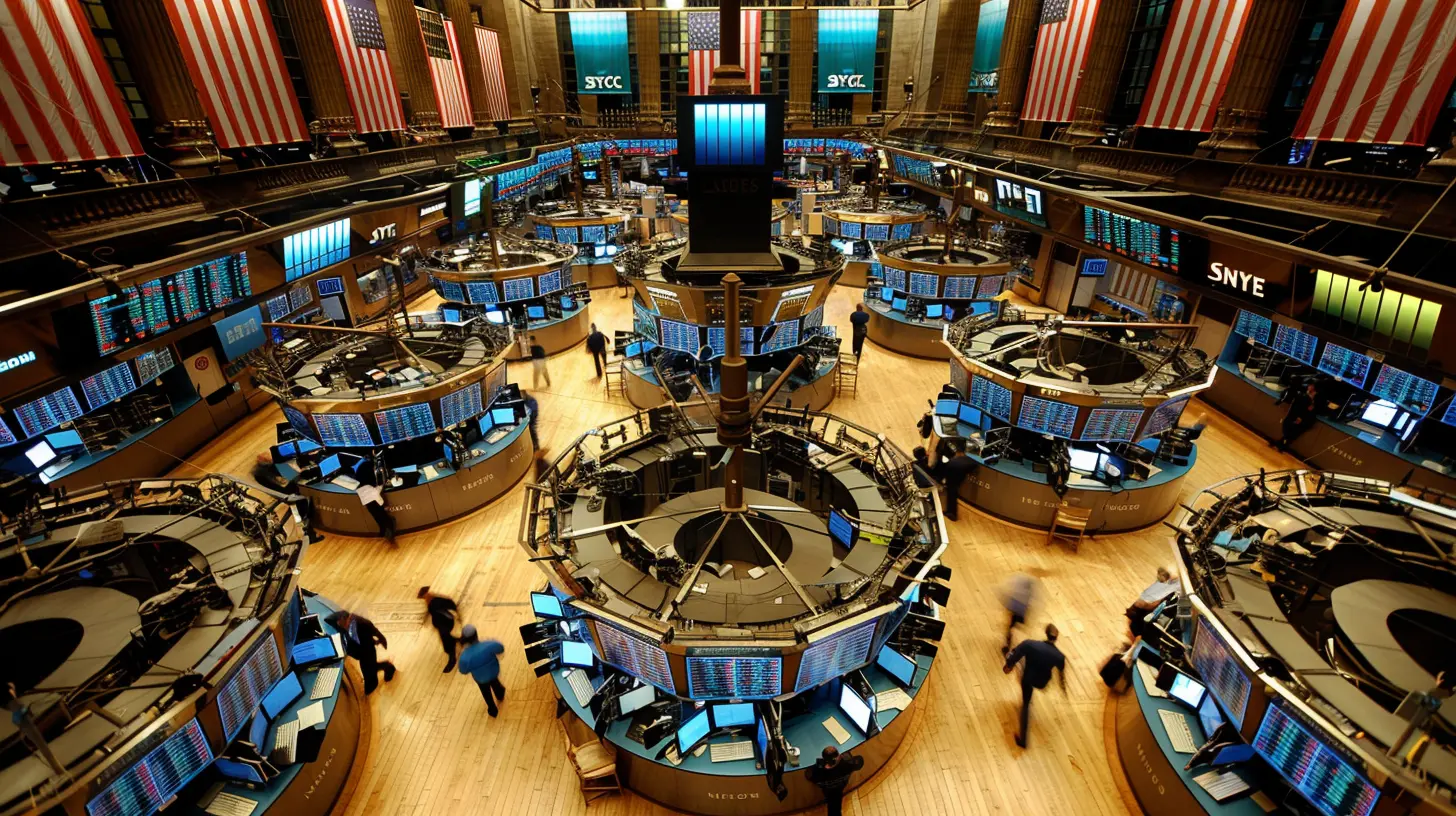Interpreting Stock Market Movements as Economic Barometers
21 July 2025
Ever felt like the stock market is speaking a language of its own? You're not alone. The chaos of rising and falling prices, the red and green tickers, and the non-stop buzz can be overwhelming. But what if I told you that the stock market isn’t just about corporations or Wall Street traders—it’s actually a mirror reflecting the health, mood, and direction of the entire economy?
Yep, that's right. The stock market can act as a kind of economic weathervane, helping us glimpse into what's really going on behind the headlines. It doesn’t predict the future with magical precision, but reading the stock market like a barometer gives us some pretty valuable clues.
So, let’s dive into interpreting stock market movements as economic barometers—a deep yet easily digestible look into how those charts help us read the story of our economy.
Why Do We Look at the Stock Market to Gauge the Economy?
Let’s think of the economy as a living body. Now, the stock market? It's kind of like the pulse. You wouldn't say someone's healthy just because their heart is beating fast or slow, right? But you would pay attention, because it reveals something.The stock market is where investors—big and small—put their money into companies they believe in. When confidence is up, money flows in. When fear creeps in, people pull out. These movements reflect what investors expect to happen—not just with the companies themselves, but with the overall economic climate.
In other words, the market often reacts before the economy actually moves. That’s why economists and analysts pay close attention to it.
Stock Market and the Economic Cycle: How They Dance Together
The relationship between the stock market and the economy is like a dance—sometimes coordinated beautifully, other times… well, it's a bit clumsy.1. Expansion: The Good Times Roll
During this phase, companies grow, jobs are added, and consumers spend more. Investors? They’re loving it. Stock prices go up because profits are strong, optimism is high, and everyone’s feeling good. It feels like riding a wave, and the water is calm.2. Peak: The Tipping Point
This is where things start to get tricky. Growth slows down. Prices may still be high, but cracks start to show. Investors become cautious. Stock market indices might hover or become volatile.3. Contraction/Recession: The Storm Hits
Companies make less money, people lose jobs, and spending drops. Investors start selling. The stock market falls—sometimes hard and fast. This is when panic sets in, and the economic forecast looks gloomy.4. Trough: The Rebuild Begins
The market starts to stabilize before the economy does. Why? Because investors start sniffing out signs of recovery—lower interest rates, government intervention, or better-than-expected earnings. It's like seeing the first flower bloom after a harsh winter.The market often leads the economy by about six months. So if stocks are rallying today, there’s a good chance that growth is coming down the road—even if the current headlines are bleak.
Key Indicators in the Stock Market That Reflect the Economy
Not all parts of the market tell the same story. Just like every instrument in an orchestra has its own role, different sectors and indexes can reveal different trends.Here are the key stock market indicators economists and financial nerds (like us!) watch closely:
1. The Major Indices (Dow, S&P 500, Nasdaq)
These aren’t just random numbers on your screen—they’re baskets of stocks that offer a snapshot of economic sectors. If the S&P 500 is climbing, it usually means that large U.S. companies are doing well, which tends to hint at broader economic strength.2. Sector Performance
Different industries react differently to changes. For example:- If consumer discretionary (think retail, travel) stocks are booming, people are spending.
- If utilities and consumer staples (like groceries) are leading, it might mean investors are getting defensive—expecting tough times.
3. Bond Yields vs. Stock Performance
This isn’t exactly in the “stock” market, but it’s closely connected. When bond yields rise while stocks fall, investors are shifting to safer ground—anticipating economic trouble. If they’re both rising? Optimism is running wild.4. Volatility Index (VIX)
Nicknamed the "fear index," the VIX measures how much investors expect the market to fluctuate. High VIX? People are nervous. Low VIX? Confidence is high.
How Investor Sentiment Plays a Role
You know that gut feeling you sometimes get before making a big decision? Investors have that too.Investor sentiment—how confident, excited, or scared people are—has a huge impact on the market. Sometimes, the stock market rises even when the economy is weak because people expect things to improve soon. Other times, stocks fall even in a strong economy due to fear of inflation, interest rate hikes, or global instability.
It’s not always rational. In fact, it’s often emotional, driven by headlines, social media, or even tweets (yes, really). That’s why interpreting stock movements also involves understanding human behavior.
When Stock Market Signals Can Be Misleading
Okay, so here’s the truth—stock market movements aren’t always reliable economic indicators. Sometimes they throw us off the scent with mixed signals.Here’s why:
- The market focuses on the future, not the present. A booming stock market doesn't mean your neighbor just got his job back—it may mean investors believe he will soon.- Speculation can distort reality. Think of the tech bubble or meme stonks like GameStop. These weren’t about the economy; they were about hype.
- Retail trading has changed the game. With apps like Robinhood, a flood of new retail investors can move markets in unpredictable ways.
So, while the stock market is a helpful economic barometer, it’s not perfect. It works best when used alongside other economic indicators like GDP growth, unemployment rates, inflation data, and consumer confidence.
The COVID-19 Example: A Case Study in Disconnection
Let’s rewind to early 2020. The world shut down, millions lost their jobs, and fear was everywhere. You’d expect the stock market to crater, right? And it did—for a while.But then something interesting happened.
The market rebounded quickly, even while unemployment was still sky-high. Why? Because investors were forward-looking. They bet on vaccine development, government stimulus, and a rapid recovery. The economy was hurting, but the market was already moving on.
This was one of the clearest examples in recent history of how the market and the economy can march to different drummers.
So, Should You Use the Stock Market to Predict the Economy?
Great question. The short answer? Yes—but with caution.Think of the stock market like your car’s dashboard. It gives you tons of useful info—your speed, fuel level, engine temperature. But it doesn't tell you about the road ahead, the weather around the corner, or if there's a traffic jam waiting.
Use the stock market as one of several tools. Watch its patterns, observe its reactions during policy changes, and see how different sectors move. But always pair it with real economic data and a healthy dose of critical thinking.
Final Thoughts: Read Between the Lines
The stock market isn’t a crystal ball, but it does whisper hints about where we’re headed. Like learning any new language, interpreting these market movements takes time, patience, and practice.If you’ve ever found yourself puzzled by why the market is soaring when times are tough or crashing when everything seems fine, remember this: the market sees the world not as it is—but as it might be.
And in that sense, it’s one heck of an economic barometer.
So next time you glance at those blinking tickers or hear about the “Dow rallying 2%,” think beyond the numbers. Ask yourself: what story is the market trying to tell us?
Because once you start listening closely, the market begins to make a whole lot more sense.
all images in this post were generated using AI tools
Category:
Economic IndicatorsAuthor:

Audrey Bellamy
Discussion
rate this article
1 comments
Elle McGlynn
This article beautifully captures the intricate relationship between stock market trends and economic indicators. Your insights offer a valuable perspective for investors seeking to navigate the complexities of market movements. Thank you for shedding light on this important topic!
August 2, 2025 at 3:22 AM

Audrey Bellamy
Thank you for your kind words! I'm glad you found the insights helpful in understanding the connection between stock market trends and economic indicators.


